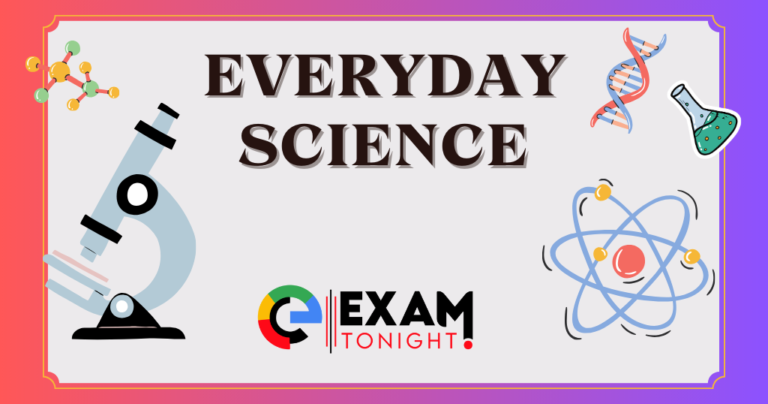Everyday Science MCQs

Everyday science Multiple Choice Questions (MCQs) typically cover a wide range of topics including physics, chemistry, biology, earth sciences, astronomy, health, and medicine. Our online everyday science-based test will prepare you for academic success in exams. Here you may discover the most repeated everyday science MCQs, comprehensive explanations of the questions as well as their answers. Every exam given by organizations such as the Federal Public Service Commission (FPSC), Khyber Pakhtunkhwa Public Service Commission (KPPSC), Punjab Public Service Commission (PPSC), Sindh Public Service Commission (SPSC), Balochistan Public Service Commission (BPSC), Azad Jammu & Kashmir Public Service Commission (AJKPSC), National Testing Service of Pakistan (NTS), Pak Army, Navy, PAF, ISSB, and others includes a General Science multiple-choice question (MCQ).
Be a part of our community! Share your latest MCQs on everyday science with us by Submitting them here. Your valuable contributions enhance the learning experience for everyone.
A. Jupiter
B. Venus
C. Mercury
D. Mars
A. Mars
B. Mercury
C. Saturn
D. Venus
A. Mercury and Venus
B. Venus and Mars
C. Mercury and Pluto
D. Venus and Neptune
A. Regions on earth without winter climate
B. Desert areas on the Sun
C. Dark patches on the surface of the Sun which are cooler areas
D. Dark patches on the surface of the Sun resulting from a localized fall in the temperature to about 4000°K
A. moon comes between the sun and the earth
B. earth comes between the sun and the moon
C. sun comes between the earth and the
moon
D. None of these
A. Moon and the Earth have gravitational force
B. Moon cannot change its position
C. The period of rotation of the Moon on its axis and period of revolution around the Earth is almost the same
D. The period of rotation of the Moon is not equal to the period of rotation of the Earth
E. None of these
A. An asteroid
B. A black hole
C. A comet
D. A dying star
A. Kepler
B. Galileo
C. Copernicus
D. Eratosthenes
A. They are meteors
B. They are the debris which got separated from a comet
C. They emit light due to extremely high temperature caused by friction while they are passing through earth’s atmosphere
D. They are a kind of a star
A. Venus
B. Mercury
C. Earth
D. Mars
